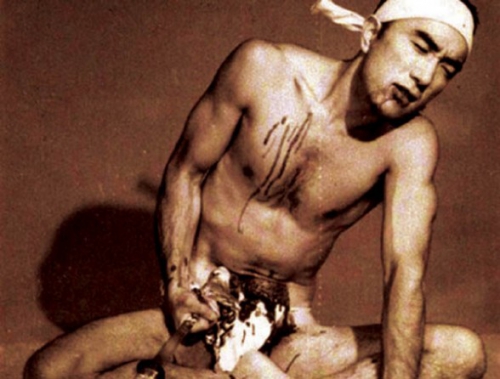vendredi, 06 mars 2015
Yukio Mishima: the Body as Spirit

The Body As Spirit: Yukio Mishima, Author, Intellectual, And Warrior
“It is… possible for people to use the body as a metaphor for ideas,” Japanese author Yukio Mishima says in Sun and Steel.
Mishima had been a weak and sickly child, doted on by his over-protective grandmother. He wasn’t allowed to play with other boys, and grew up alienated from male culture (as well as from his mother, who was not allowed to look after him unsupervised). For him, Mishima says, “words came first of all; then… came the flesh. It was… already wasted by words.”
For the author the answer to this waste — which he must have seen also in the Japan of post-World War II, defeated by the American atomic bomb — was to take up Kendo (traditional Japanese sword fighting) and bodybuilding, and to transform his thin frame into a powerful vehicle that could compete with his intellect.
The competition was partly one for attention, and partly one for a Way of being. Like aesthetes in the West, flamboyance and sincerity were not alien to each other, but one and the same. Controversially, Mishima formed his own private army, of about 100 members: the Tatenokai or “Shield Society.” He wanted, he said, to create a society for students who couldn’t, because of ideological reasons, join the Marxists on campus — Marxism was all the rage at the time.
One of the issues that divided the author and the Marxists (whom Mishima respected) was devotion to the emperor. Mishima never said it, but another — and perhaps an even more important area — was the body. The Tatenokai, and Mishima’s own “Way” of being was increasingly to the physical. In a flash of insight, Mishima
understood all kinds of things hitherto unclear to me. The exercise of the muscles elucidated the mysteries that words had made. It was similar to the process of acquiring erotic knowledge. Little by little I began to understand the feeling behind existence and action.
Marxism was intellectual. Mishima was increasingly concerned with the physical, precisely as an expression of ideas rooted in a kind of primordial drama. The flash of insight had come as the author considered the nature of tragedy.
Tragedy, says Mishima, “is born when the perfectly average sensibility momentarily takes unto itself a privileged nobility…”
It follows that he who dabbles in words cannot participate in it. It is necessary, moreover, that the “privileged nobility” find its basis strictly in a kind of physical courage… Tragedy calls for an anti-tragic vitality and ignorance, and above all a certain ‘inappropriateness.’
By “ignorance,” of course, Mishima does not mean stupidity, vulgarity, or uncouthness (Mishima was very much concerned with elegance, though not as we might understand it today), but, rather, a move away from the intellect toward instinct.
Inoffensive in the West, “inappropriateness” was perhaps a more shocking idea in Japan of Mishima’s era (and even today), where rules of social etiquette are strict and complex, and understanding ones place in the order of society comes as second nature. But, the tragic hero must, of course, go against the convention of his own time. He is the one that steps forward, taking on the challenge to save society from some existential threat, while everyone else goes about their more mundane business.
It is odd, then, that Mishima suggests that the physical body “is foreign to the spirit,” being closer to ideas. Nevertheless, in criticizing those who allow their bodies to become ugly, he suggests that the body can be a vehicle for the spirit. A bulging belly is a “sign of spiritual sloth”, for example. This and other unattractive traits, says Mishima, is “as though the owner were exposing his spiritual pudenda on the outside of his body.”
The author equates such physical ugliness with “individuality.” “If,” says Mishima cryptically, “the body could achieve perfect, non-individual harmony, then it would be possible to shut individuality up for ever in close confinement.” But the idea of “perfect, non-individual harmony” seems to be key to Mishima’s growing interest in the physical. He could escape from the world of the internally and externally ugly through perfecting the body and making that his guiding spirit.
Angel Millar is an author, blogger, and the editor of People of Shambhala.
00:05 Publié dans Littérature | Lien permanent | Commentaires (0) | Tags : yukio mishima, mishima, japon, lettres, lettres japonaises, littérature, littérature japonaise |  |
|  del.icio.us |
del.icio.us |  |
|  Digg |
Digg | ![]() Facebook
Facebook





Les commentaires sont fermés.